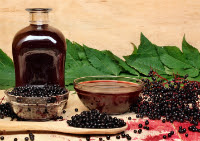 For millennia, physicians and herbalists have found medicinal uses for all parts of the elder tree, including its wood, leaves, flowers, and berries. The branches of this native European plant were believed to cast off evil spirits. Leaves were used in ointments to heal wounds. Flowers and berries were used to make wine; infusions were a common treatment for colds and rheumatic conditions. Today, herbalists and holistic physicians commonly recommend elderberry for its immunity-boosting properties.
For millennia, physicians and herbalists have found medicinal uses for all parts of the elder tree, including its wood, leaves, flowers, and berries. The branches of this native European plant were believed to cast off evil spirits. Leaves were used in ointments to heal wounds. Flowers and berries were used to make wine; infusions were a common treatment for colds and rheumatic conditions. Today, herbalists and holistic physicians commonly recommend elderberry for its immunity-boosting properties.
Elderberries are rich in vitamin C and flavonoids that act as antioxidants and exhibit anti-inflammatory properties. Studies have shown that elder extracts may inhibit the replication of viruses.
Elderberry syrup is made from an extract of elder fruits. Lozenges are often prepared with zinc and other herbs. Both are commonly used to help tame colds, coughs, and relieve flu symptoms. Syrups and lozenges are available on the market, but always check with your personal wellness practitioner to be sure it is a quality product and you are taking an appropriate dose.
Important caution: Unripe berries are not safe to eat nor are the other parts of the elder plant. Since elderberry stimulates the immune system, it is not recommended for people with autoimmune conditions.
References:
- Duke, J. A., et al. Handbook of Medicinal Herbs. 2nd ed. Boca Raton, FL: CRC Press, 2002. 267-268.
- Johnson, R.L., S. Foster, T. Low Dog and D. Kiefer. National Geographic Guide to Medicinal Herbs: The World’s Most Effective Healing Plants. Washington, D.C.: National Geographic, 2012. 71-73.




